Reply To:
Name - Reply Comment
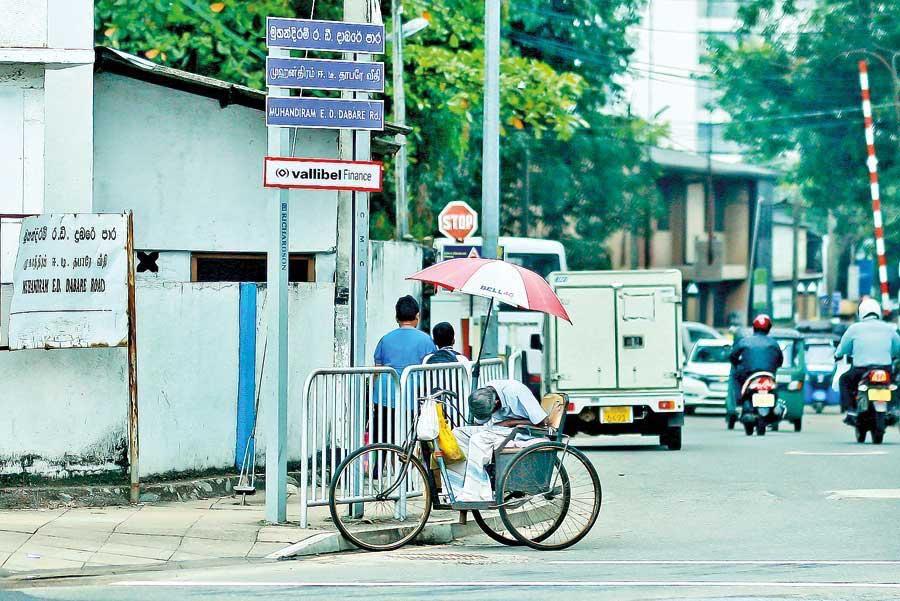
- Once the breadwinners of families are arrested during a crisis situation, it’s a huge burden to the family
- Sri Lanka has one of the fastest growing ageing populations in South and South East Asia
- A large number of older adults may be uninformed and may not have access to adequate information on prevention and precautionary methods
The world is mourning. Sri Lanka too is in a critical state as two lives were already claimed by the killer coronavirus or COVID-19. Although people continue to stay indoors, it may not be a merry-making time for all. A photo portrayed women being admitted to the National Hospital’s Accident Ward as a result of 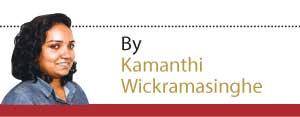 domestic violence, was widely shared on social media at the onset of the curfew. Another Twitter post by Protecting Environment and Children Everywhere (ECPAT) Sri Lanka stated that incidences of child abuse cases have increased by 33% during the curfew period. Several more vulnerable segments such as the special needs population, homeless and the elderly may also need more attention during these trying situations.
domestic violence, was widely shared on social media at the onset of the curfew. Another Twitter post by Protecting Environment and Children Everywhere (ECPAT) Sri Lanka stated that incidences of child abuse cases have increased by 33% during the curfew period. Several more vulnerable segments such as the special needs population, homeless and the elderly may also need more attention during these trying situations.
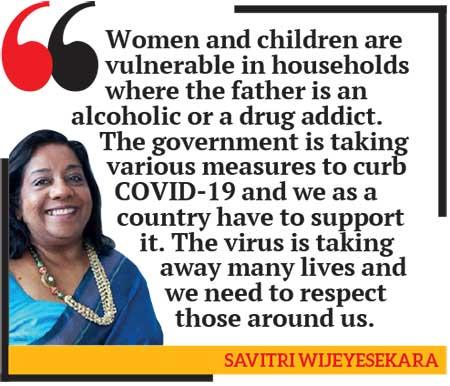 “This is a wonderful opportunity for the family to bond,” opined Savitri Wijeyesekara, Executive Director at Women-in-Need. “You can spend time with children and learn to understand and respect the family. Women and children are vulnerable in households where the husband/father is an alcoholic or a drug addict. The government is taking various measures to curb COVID-19, and we, as a country, have to support it. The virus is taking away many lives and we need to respect those around us. Our hotlines are working and our mobile counselling centres are also open for those who need support”, she said.
“This is a wonderful opportunity for the family to bond,” opined Savitri Wijeyesekara, Executive Director at Women-in-Need. “You can spend time with children and learn to understand and respect the family. Women and children are vulnerable in households where the husband/father is an alcoholic or a drug addict. The government is taking various measures to curb COVID-19, and we, as a country, have to support it. The virus is taking away many lives and we need to respect those around us. Our hotlines are working and our mobile counselling centres are also open for those who need support”, she said.
“Before the curfew was imposed, we used to receive around 40 complaints a day,” observed Prof. Muditha Vidanapathirana, Chairman of the National Child Protection Authority. “Out of them, we noticed that around 10% 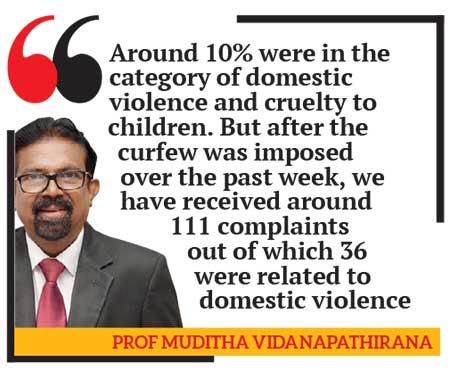 were in the category of domestic violence and cruelty to children. But after the curfew was imposed over the past week, we have received around 111 complaints out of which 36 were related to domestic violence.”
were in the category of domestic violence and cruelty to children. But after the curfew was imposed over the past week, we have received around 111 complaints out of which 36 were related to domestic violence.”
Explaining further he said that perpetrators of child abuse are usually a known person. “A significant number of parents abuse their children. Due to the curfew, and it is very unfortunate to note that the perpetrators and victims are both at home! We used to receive cases of cruelty to children not only from home, but from educational institutes, places of worship and so forth. But now, 100% of cases are from home. What people need to understand is that children undergo various complications. Once the breadwinners of families are arrested during a crisis situation, it’s a huge burden to the family,” Prof. Vidanapathirana said.
“Parenthood is an important position in society, but in most cases parents themselves can’t remember their childhood. So, I kindly request from society to look after the children and protect them from becoming victims of abuse. This will lead to many psychosocial issues on the long run,” he added.
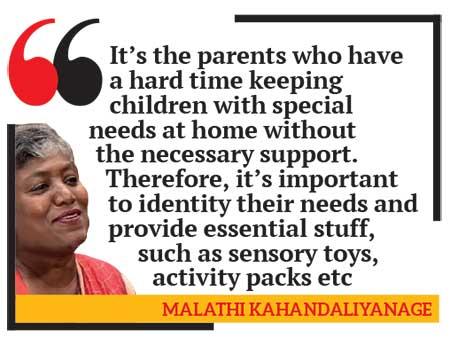 As the world continues to stay indoors, it may be adding a burden to several segments in our society. “Talking about special needs population, this would be a great time to do a census as there are no actual numbers even to think of their needs to help,” said Malathi Kahandaliyanage, Consultant Education and Behaviour Therapist. “It’s the parents who have a hard time keeping children with special needs at home without the necessary support. Therefore, it’s important to identity their needs and provide essential stuff, such as sensory toys, activity packs etc. Teachers need to get involved in each area to do fun- learning activities that the whole family can do and keep them mentally healthy,” she said.
As the world continues to stay indoors, it may be adding a burden to several segments in our society. “Talking about special needs population, this would be a great time to do a census as there are no actual numbers even to think of their needs to help,” said Malathi Kahandaliyanage, Consultant Education and Behaviour Therapist. “It’s the parents who have a hard time keeping children with special needs at home without the necessary support. Therefore, it’s important to identity their needs and provide essential stuff, such as sensory toys, activity packs etc. Teachers need to get involved in each area to do fun- learning activities that the whole family can do and keep them mentally healthy,” she said.
A study finds that Sri Lanka has one of the fastest growing ageing populations in South and South East Asia due to early progress in reducing fertility rates, increasing life expectancy, economic development and increase in non-communicable diseases. Hence, it’s imperative that Sri Lanka takes note of certain concerns and take precautionary methods to curb the spread of COVID-19 among the most vulnerable populations in Sri Lanka in a timely manner. “It was widely publicized that people over 60 years of age are more vulnerable to the virus and therefore it is important to find out how Sri Lanka is geared to respond to the increase in COVID-19 patients, especially those who require respiratory support,” says Madara Marasinghe, corresponding author to the study and a PhD candidate in Public Health and Health Systems at University of Waterloo Canada. “The second concern is about long-term care facilities for older populations in low- and middle-income countries. It is evident that long- term care facilities are not upgraded as those in high income countries and are often not well regulated. However, there’s evidence that in countries such as US and Canada, COVID-19 is compromising nursing home residents. As at March 16, all deaths in Canada have occurred in care-giving homes.”
"The study further identifies the importance of limiting visits to care-giving homes as means of reducing potential risks on loved ones in long-term care-giving facilities"
The study further identifies the importance of limiting visits to care-giving homes as means of reducing potential risks on loved ones in long-term care-giving facilities. But their quality of life also matters and the study suggests the use of technology to bond with them. The third concern as pointed in the study is the inclusion of older people in government responses. Some may be living alone or may be dependent on others, and therefore, their access to food and essential medicines too needs to be taken into consideration. A large number of older adults may be uninformed and may not have access to adequate information on prevention and precautionary methods. The fourth concern is the common family dynamism, where grandparents look after grandchildren, thereby limiting their chances to be on self-quarantine. Therefore, it’s important to provide alternative child care methods and provide flexibility and relief around working hours for workers with children.
If you come across any cases of violence or abuse call Women-In-Need (WIN) on their 24-hour helpline 0114 718585 or 777 349100 or you could download the 2SIX4 mobile App.
Cases regarding cruelty towards children could be reported to NCPA’s Childline 1929.